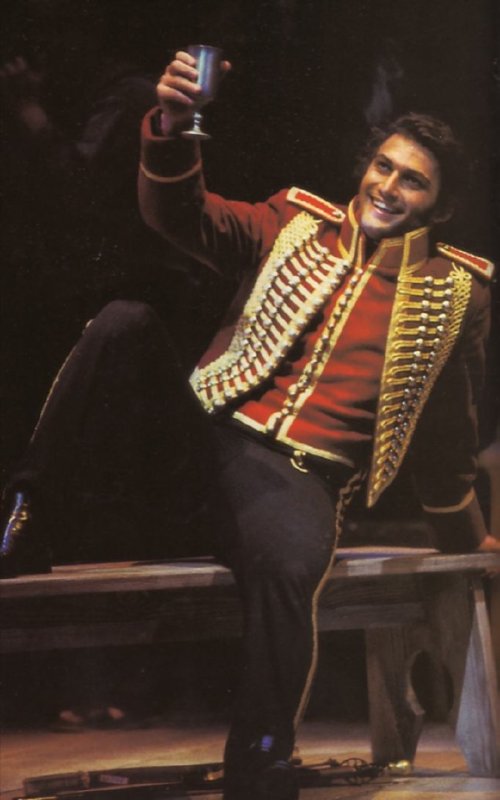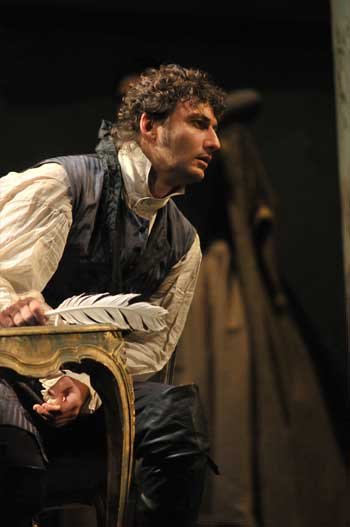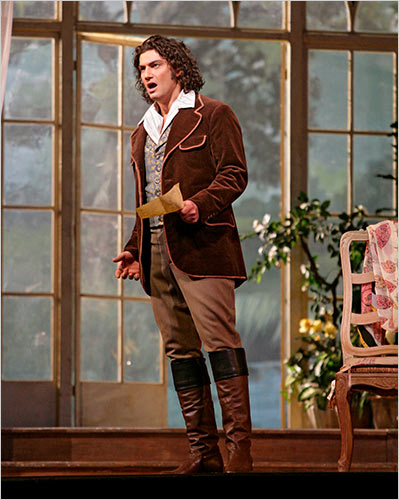|
|
|
|
|
|
|
| New York Times, 15 May 2009 |
| By MATTHEW GUREWITSCH |
Tenor at the Top Is Determined to Stay There
|
|
 FROM
his safe haven in the ensemble of the Zurich Opera House, Jonas Kaufmann has
seen more than one young tenor set the world on fire and swiftly flame out.
Now that he is racking up triumphs in one musical capital after another, he
hopes his path will be different. FROM
his safe haven in the ensemble of the Zurich Opera House, Jonas Kaufmann has
seen more than one young tenor set the world on fire and swiftly flame out.
Now that he is racking up triumphs in one musical capital after another, he
hopes his path will be different.
“To reach the top is definitely less difficult than to stay there,” Mr.
Kaufmann, 39, said recently by telephone between performances of Massenet’s
“Manon” at the Vienna State Opera, the scene of his latest conquest. “In the
past no one became a star overnight. Now things can happen very fast. Quick
to rise, quick to fall. I’m very thankful for my 15 years of experience. I
can lean back and be a little more relaxed at all the craziness than if I
were a rookie.”
Big dates are looming. On Friday Decca will release Mr. Kaufmann’s CD of
scenes and arias from German opera. On Saturday, for the 60th anniversary of
the German constitution, Mr. Kaufmann will join Daniel Barenboim and the
Staatskapelle Berlin for a telecast of Beethoven’s Ninth Symphony from the
Brandenburg Gate in Berlin. And on July 5 he will sing the title role of
“Lohengrin” for the first time, at the Bavarian State Opera in Munich, his
hometown, though he has not performed there much. This will be his first
major Wagner with a leading international company.
“I sang small roles at the house when I was in school,” Mr. Kaufmann said.
“That was a big mistake. For a long time the management just saw me as the
student I used to be.”
Among heroic tenor roles Lohengrin, the white knight sent by the Holy Grail,
occupies a niche apart, suffused in a shimmer of otherworldly orchestral
sound. Wagner’s unhinged patron, Ludwig II, the last king of Bavaria,
identified deeply with the character, and to play him in Ludwig’s capital is
no small honor. To judge from the opening tracks of the new CD, Lohengrin’s
narrative of the Grail and his farewell, Mr. Kaufmann seems unlikely to
disappoint.
His first recital disc for Decca, last year, included one Wagner track (the
Prize Song from “Die Meistersinger von Nürnberg”) but otherwise ranged
widely, through Verdi, Puccini, Bizet, Massenet, Berlioz and beyond. “It was
my calling card,” Mr. Kaufmann said.
A critic once described his timbre as, paradoxically, “light and dark,” an
assessment the album bears out. It also documents Mr. Kauffman’s elegant
musicianship, his idiomatic ease in three languages and a temperament that,
though introverted by operatic standards, is thoroughly involving. Though he
rises easily to the pitch of high passion, intimate passages seem whispered
into the ear. He can achieve that effect in the theater as well, though it
is harder.
The disc to be released Friday, though entirely in German, ranges widely
too, doubling back from “Lohengrin” to Mozart, rare Schubert and Beethoven
before returning to Wagner with climatic sequences from “Parsifal.”
 “We deliberately
avoided chronological order,” Mr. Kaufmann said. “The arc is emotional. Some
of the material is very explosive. Some of it is very lyrical. But the
mainspring for everything is Sehnsucht, the sense of longing the German
Romantics wrote so much about.” “We deliberately
avoided chronological order,” Mr. Kaufmann said. “The arc is emotional. Some
of the material is very explosive. Some of it is very lyrical. But the
mainspring for everything is Sehnsucht, the sense of longing the German
Romantics wrote so much about.”
Though A-list symphonic maestros seldom lend themselves to such mixed
programs, Claudio Abbado did so gladly in this case.
“I regard Kaufmann as certainly one of the greatest tenors on the
international scene,” Mr. Abbado said from Bologna. “He is a complete
artist, the only one who could pass the test of such a broad repertory with
such assurance and such excellent results.”
His experience tells. Mr. Kaufmann saw his first opera — Puccini’s “Madama
Butterfly” — from the front row of the Bavarian State Opera at 5. (The one
thing that bothered him was Cio-Cio-San’s curtain call. How could she take a
bow when she was dead?) Right away he decided to be an opera singer when he
grew up. He started to study voice in his midteens, graduating from the
Hochschule für Musik in Munich in 1994. The local opera houses could not
have cared less.
Bouncing around the German provinces Mr. Kaufmann took part in the premiere
of Antonio Bibalo’s “Glass Menagerie” in Trier and spent two summers as
Sigmund Romberg’s Student Prince at Heidelberg Castle. In Italy, Giorgio
Strehler hired him for Mozart’s “Così Fan Tutte” in a cast of young
unknowns. The production, at the Piccolo Teatro di Milano, was to be that
legendary director’s last.
In 2000 Mr. Kaufmann joined the ensemble of the Zurich Opera House (capacity
1,165), gaining the security to raise a family and time to grow into leading
roles in many styles, including some that would have been folly to try on
larger stages at the time (notably Wagner’s Parsifal). Guest performances
took him to other stages, often in a regional journeyman capacity, though in
2001 audiences at the Lyric Opera of Chicago embraced him as a star on the
strength of his portrayal of Cassio, the dashing young officer in Verdi’s
“Otello” with a weak head for wine and no aria to sing. This season in
Chicago he sang his first Des Grieux in “Manon,” opposite the scintillating
singing actress Natalie Dessay.
These days Mr. Kaufmann fields constant offers for new productions at the
top houses. The soprano Angela Gheorghiu does not mind taking credit, having
requested him as her love interest in prima donna vehicles like Puccini’s
“Rondine” and Verdi’s “Traviata” at the Metropolitan Opera, Covent Garden
and La Scala on the strength of a DVD from Zurich that her manager gave her.
“My instinct has never deceived me,” Ms. Gheorghiu said recently. Image
conscious as she is, she must have noticed that in addition to the musical
goods, Mr. Kaufmann has the build of a model and the face of a Renaissance
portrait. She said she also insisted on him over more familiar names, for
the recent EMI studio recording of “Madama Butterfly,” an opera new to them
both.
Powerhouse appearances in London, Vienna, Milan and Paris in weighty parts
like Bizet’s Don José (in “Carmen”) and Puccini’s Cavaradossi (in “Tosca”)
have shown Mr. Kaufmann to be much more than a diva’s trophy walker. Still,
asked to list the milestones of his career, he names just one: his Met debut
in 2006, opposite Ms. Gheorghiu, as a midseason replacement in “La
Traviata.”
 “I came to the Met as more or less a nobody,” Mr. Kaufmann said, “and the
audience gave me a standing ovation. I was overwhelmed, absolutely. The
reaction wasn’t based on my name or my reputation but 100 percent on what I
did that night. From that moment on all the European houses that had already
hired me suddenly took me more seriously. It was like the Ritterschlag — how
do you say that in English?” The dictionary gives “accolade,” in the sense
of the stroke of a ruler’s sword, conferring knighthood. “I came to the Met as more or less a nobody,” Mr. Kaufmann said, “and the
audience gave me a standing ovation. I was overwhelmed, absolutely. The
reaction wasn’t based on my name or my reputation but 100 percent on what I
did that night. From that moment on all the European houses that had already
hired me suddenly took me more seriously. It was like the Ritterschlag — how
do you say that in English?” The dictionary gives “accolade,” in the sense
of the stroke of a ruler’s sword, conferring knighthood.
The Paris Opera is scheduled to have Mr. Kaufmann in January for the title
role in Massenet’s “Werther” (role debut, new production). His commitments
have precluded premieres at the Met for a while, though he has signed as
Siegmund (another role debut) in the new Robert Lepage production of
Wagner’s “Ring” beginning in 2010-11. Meanwhile he will be back next April
as a late-season replacement in new productions of “Carmen” and “Tosca.”
For now his mind is mostly on Lohengrin. “He has many layers,” Mr. Kaufmann
said. “Underneath the radiance there’s bitterness and disappointment. Making
him sympathetic isn’t easy. What people tend to see in a hero is the heroic
exterior. But what’s interesting is not the shell. It’s the human being
within.” |
| Fotos: Otello, Chicago, Robert
Kusel/Lyric Opera of Chicago |
| Manon, Chicago, Dan Rest/Lyric Opera of Chicago |
| La Traviata, Metropolitan Opera, Ken
Howard/Metropolitan Opera |
|
|
|
|
|
|
|
|
|
|
|
|
|
|
|